COVID-19
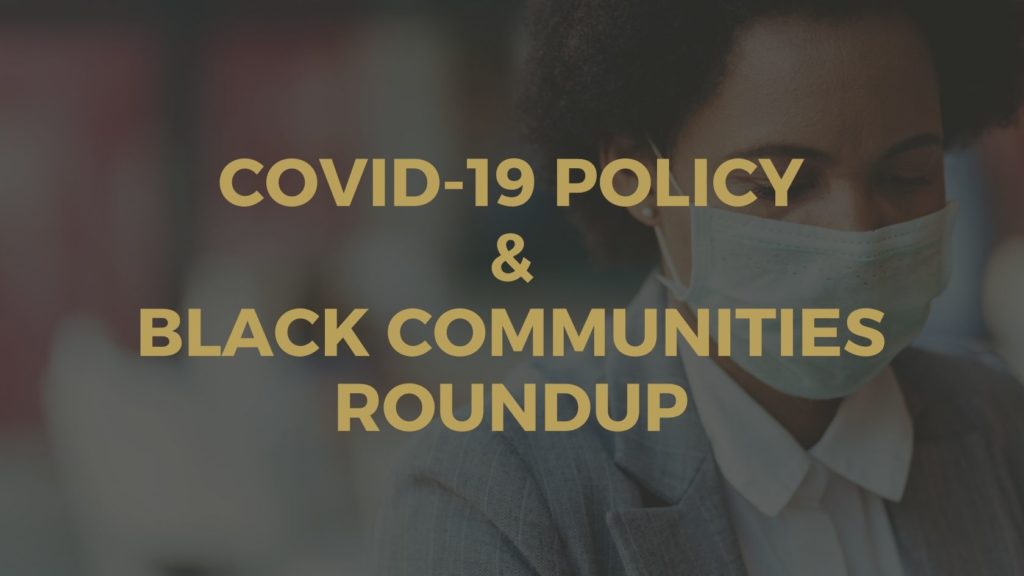
November 3 COVID-19 Policy & Black Communities Roundup
It’s Election Day! Since 1970, the Joint Center has celebrated and supported the civic engagement of Black communities. If you have not yet voted, visit vote.org to learn more about how to cast your ballot today.
Finger-Pointing Continues Over Delayed Stimulus
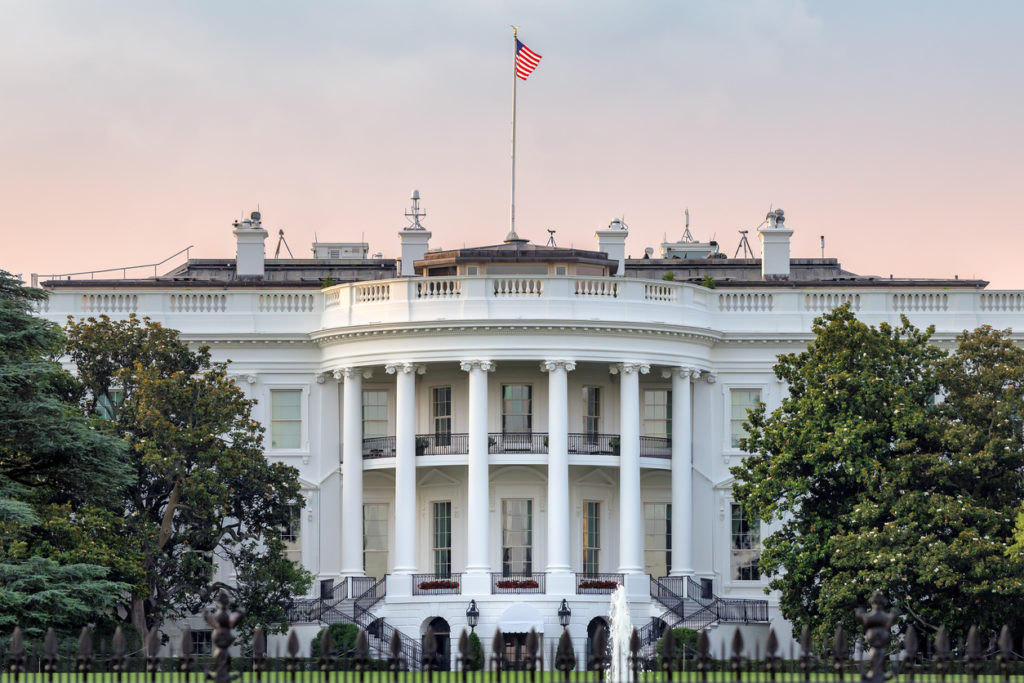
A stalemate between the White House and House Democrats continues to delay a new round of coronavirus relief as Speaker Nancy Pelosi (D-CA) presses Treasury Secretary Steve Mnuchin for an agreement on a proposed $2.2 trillion stimulus package. Blaming Pelosi for the failure to reach an agreement, President Trump says the White House will approve a “big” stimulus package after the election, assuming the GOP gains control of the House of Representatives.
Other Key Issues
Medicare will cover all costs of any FDA-approved COVID-19 vaccine under a new White House policy, The Hill reports. The policy also implements provisions of the CARES Act that call for most private insurers to cover a COVID-19 vaccine without cost-sharing.
Common Sense, Education Superhighway, and Boston Consulting Group offer recommendations to close the digital divide in K-12 public education. According to the recommendations, 30 percent of Black students live in households without access to broadband.
The Congressional Black Caucus Foundation offers policy recommendations to address current inequities in public transportation resources and how shared mobility, electric vehicles, and autonomous vehicles can more equitably serve the Black community.
Economic Studies & COVID-19
Initial unemployment claims fell to 751,000 for the week ending October 24. The number marks the lowest level since March 14, but remains higher than the pre-pandemic initial weekly claims record of 695,000 set in 1982.
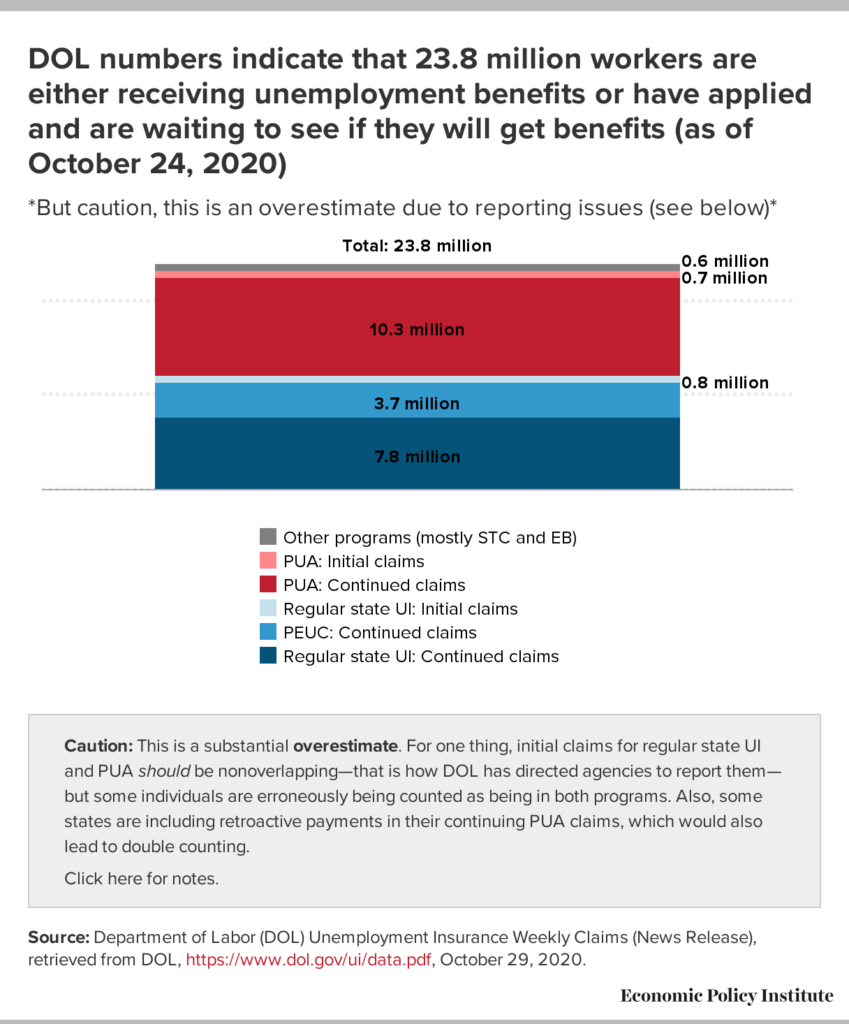
The Economic Policy Institute estimates that total initial unemployment claims were 1.1 million as of October 24 when including the 360,000 Pandemic Unemployment Assistance (PUA) claims. PUA covers gig and freelance workers who are not typically eligible for regular unemployment benefits.
Black and other communities of color continue to suffer disproportionately from the economic consequences of the coronavirus pandemic, according to the Urban Institute. Over one-quarter of adults in Black households surveyed between August 19-31 used savings or sold assets to meet economic needs in the previous week. Twenty-four percent of Black adults lived in households that were behind on rent payments. And approximately one-third of African Americans shared a household with someone expected to lose employment income in the next four weeks.
The current rental market could usher in another housing crisis, according to the Wall Street Journal, and people of color are at heightened risk since they are more likely to owe back rent. “Black and Latino Californians were twice as likely as white Californians to face rent insecurity amid the pandemic,” the Journal reports.
As many as 12 million people have yet to receive their stimulus checks, ProPublica reports, including up to 2 million eligible inmates of prisons and jails, who are typically supported by their families, and “who [themselves] are disproportionately low-income people of color—a demographic that has been hit hard by the pandemic’s economic fallout.”
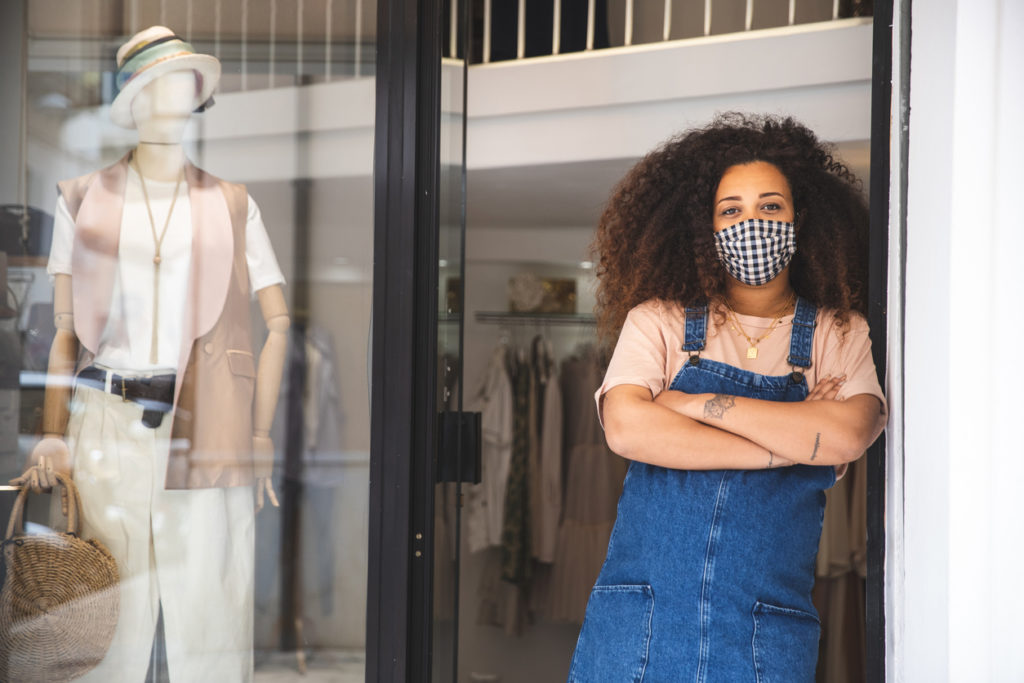
Forbes interviews Black women business owners decimated by the pandemic. According to Forbes, 31 percent of Black-owned businesses in Goldman Sachs’ entrepreneurial program say less than one-fourth of their pre-COVID revenue has returned.
As the COVID-19 pandemic reaches another peak, the Brookings Institution advocates for continued hazard pay for frontline essential workers. Brookings points out that nearly half of these low-wage, frontline workers are nonwhite, “with Black and Latino or Hispanic workers overrepresented among critical jobs that pay less than a living wage.”
A Washington Post columnist makes a connection between the need for Black people to participate in coronavirus vaccine trials and the economic recovery of Black communities, despite their mistrust of vaccines and the medical community.
Inside Higher Ed reports that conversations about racial justice and social equity at colleges and universities often exclude Black nonacademic, nonadministrative staff. Black workers at higher education institutions—often COVID’s essential workers—have faced shifts in their treatment and compensation driven by universities outsourcing jobs, stagnant wage growth, and a culture of disrespect.
Political Studies & COVID-19
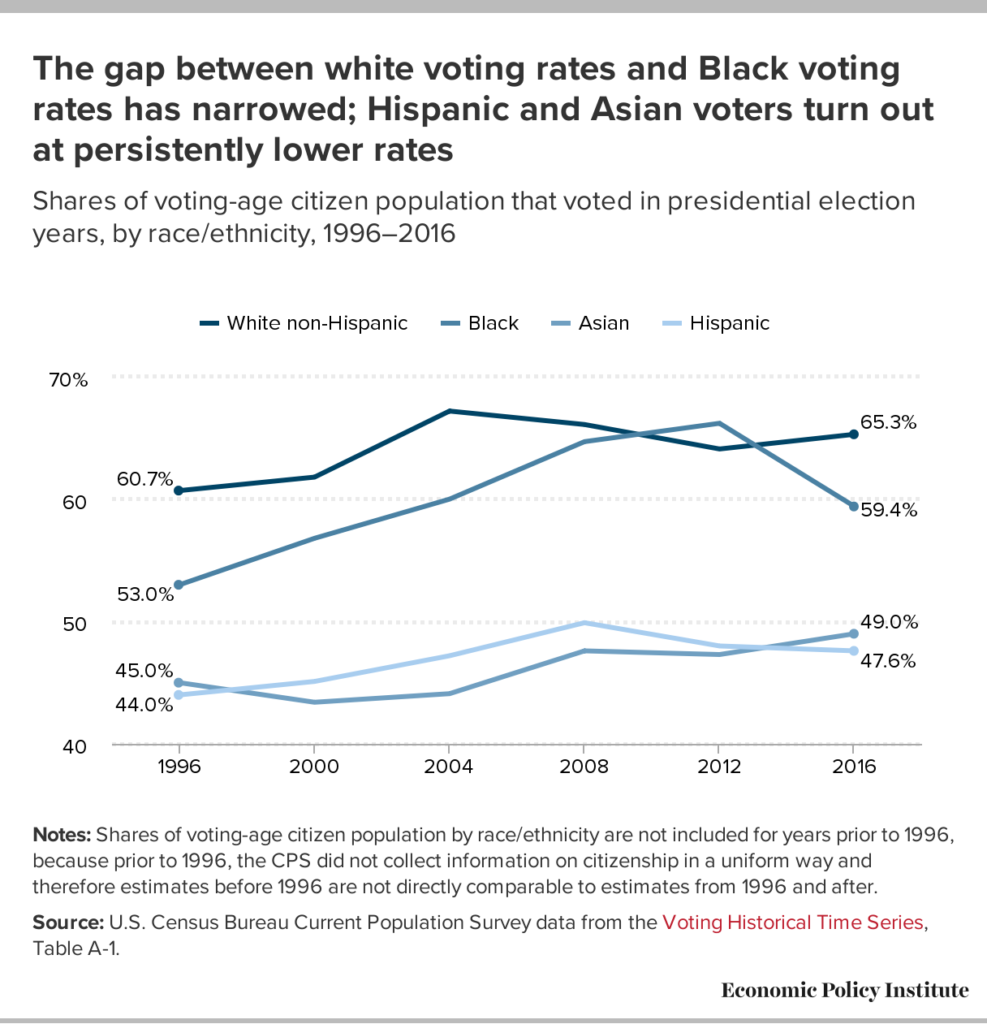
The Economic Policy Institute questions whether the groups most affected by COVID-19, including Black Americans, will turn out to vote on November 3. Black voter registration and participation has increased since the 1965 Voting Rights Act, closing the gap with white voters, but rates dipped below white voting rates in the 2016 presidential election, amid higher reports of voter intimidation and suppression as compared to recent elections.
Dēmos recommends strategies to combat voter suppression among Black and other voters of color in New Mexico. Strategies include automatically sending mail-in ballots with postage-paid envelopes, establishing statewide standards for expanded early voting, and making Election Day a statewide holiday.
Black Futures Lab and Dēmos detail how newly implemented vote-by-mail policies have resulted in new voter-suppression methods, including unclear eligibility requirements for mail-in voting.
Black high school and college students are being recruited as poll workers to step in for older people, who are more vulnerable to the coronavirus, NBC News reports. There are several volunteer recruitment efforts focused on urging young people, particularly people of color, to sign up to be a poll worker. As of October 23, more than 10,000 students have signed up, primarily in 10 battleground states. Last month, a partnership with More Than a Vote, a high-profile coalition of athletes like NBA player LeBron James, the NAACP Legal Defense Fund, and Power the Polls signed up 10,000 poll workers.
Experts are predicting that more than 1 percent of the 70 million mail-in ballots may be rejected, according to NBC News. Mail-in ballots from Black voters are more likely to be rejected than those of white voters, the report notes. In North Carolina, Black voters’ ballots are being rejected at three times the rate of white voters.
Lawyers’ Committee for Civil Rights Under Law President and Executive Director Kristen Clarke stresses the power of down-ballot races should not be overlooked in this election, citing local elections’ critical role in police reform, racial justice, and education.
The Kaiser Family Foundation reports on the disproportionately high mortality rates due to COVID-19 of Black and other people of color in nursing homes. According to the analysis, 63%of nursing homes where African Americans compose 20% or more of residents reported at least one coronavirus death versus only 40% of nursing homes where African Americans were less than 20% of their resident population reporting such deaths.
COVID-19 creates significant burdens on students of Historically Black Colleges and Universities (HBCUs). Their families, for example, more often rely on them to work in order to assist with household expenses. The students also have increased mental health needs and suffer disproportionately from food insecurity, racial unrest, economic losses, and other fallout from the pandemic.
Movement Building
Advancement Project, Georgia NAACP, New Georgia Project, and Georgia Latino Alliance for Human Rights launch TransformGeorgia.org, a coalition to advocate for voters’ awareness of local sheriff elections that will influence policing in Georgia.
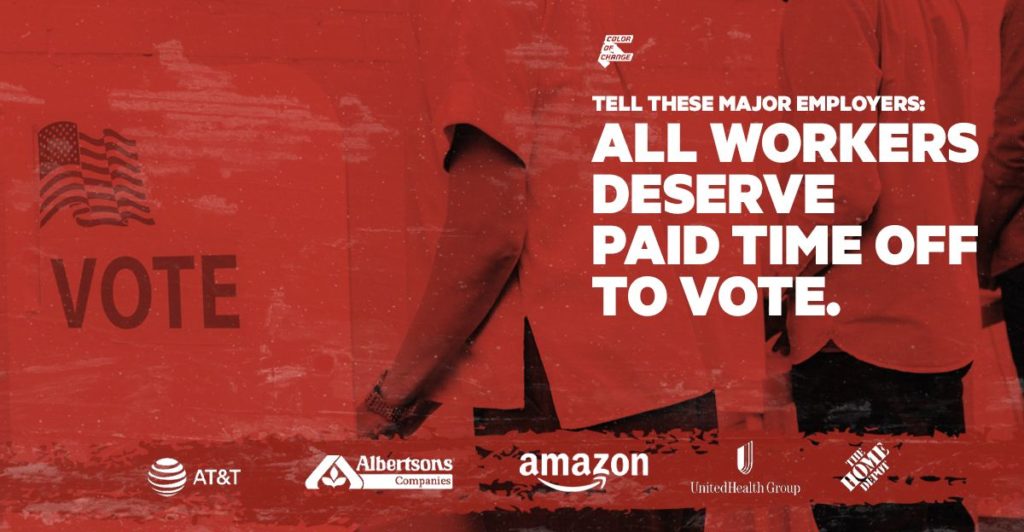
Color of Change issues a petition demanding Albertsons and Safeway to give their employees paid time off to vote.
Color of Change PAC hosts the virtual Black Joy Call Party to dance to music while calling Black voters in swing states to make sure their vote gets counted.
The Congressional Black Caucus releases a statement on the Senate confirmation of Judge Amy Coney Barrett: “Senate Republicans chose to prioritize voting on a Supreme Court nomination instead of voting on COVID-19 relief for the American people, disregarding the urgency of this relief for communities that have been hit the hardest due to the pandemic.”
The Neighborhood Assistance Corporation of America offers free rides to polling places in Georgia, South Carolina, North Carolina, and Texas.
SisterReach provides free food and more to voters in Memphis as they cast their vote.
Events
Upcoming events include “Coronavirus Relief Fund Updates: Spending Strategies Under Multiple Deadline Scenarios” (National Association of Counties, November 6); “US News and World Report: COVID-19 and Native American Health, How Tribal Leaders Are Beating Back the Virus” (U.S. News & World Report, November 9); “Small-Business Lending after the Paycheck Protection Program: What’s Next?” (Urban Institute, November 17); “Building the Dream: The Housing Affordability Agenda” (The Hill, November 17).
Last week, events were held by Brookings Institution, Center for American Progress, Color of Change, Knight Foundation, Leadership Conference on Civil and Human Rights, Movement for Black Lives, National Urban League, OWN, Rainbow PUSH Coalition, SisterReach, and The Lincoln Project.
Podcast
The Hybrid University (Future U Podcast)

